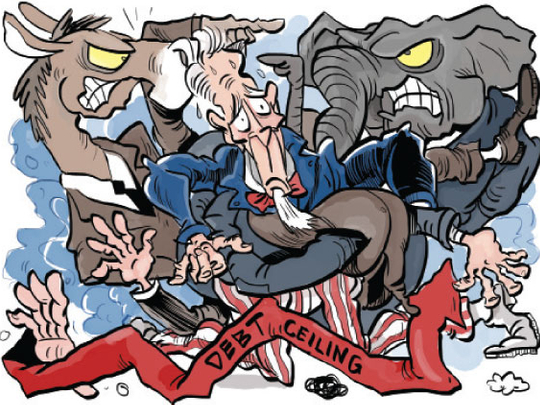
Aristotle called politics “the art of the possible,” but is politics — politics in the classical sense — possible at all in today’s Washington? This is a question that is hard to avoid after watching last week’s events in the US capital.
On the plus-side, there was the debt ceiling vote. This is a strange political ritual no other rich country forces on itself in which legislators are asked to authorise paying back borrowed money that the government has already spent. For decades, whichever party controlled each House of Congress treated debt ceiling votes as an annoying chore — one that allowed the minority party to vote ‘no’ safely and make speeches about fiscal responsibility that were both disingenuous and self-righteous (a very good one was delivered by Senator Barack Obama in 2006).
Failing to raise the debt ceiling would destroy America’s credit rating and potentially throw global financial markets into turmoil, but, in recent years, a growing number of Republicans have threatened to block regular increases, or at least to demand huge budget cuts and policy concessions from President Barack Obama in return for their votes.
After several unpleasant debt ceiling showdowns over the last three years, however, House Speaker John Boehner last week did what he had once sworn not to do: present the House with a ‘clean’ debt ceiling bill (i.e. one with no conditions or unrelated measures attached) and allow it to pass with votes mostly from Democrats.
One may point out that raising the debt ceiling was never supposed to be this hard, but in today’s Washington, it is probably best to take progress wherever and whenever one can. The reason was on display at about the same time that Boehner was preparing to send the debt measure to the House.
Asked by reporters whether he would move forward with an immigration reform bill — a measure virtually every political pundit in America believes is vital to the health of the Republican Party — Boehner said: no. “There’s widespread doubt about whether this administration can be trusted to enforce our laws,” he told a news conference. He went on to explain that because of this fact “it’s going to be difficult to move any immigration legislation until that changes.”
The stunning thing was not the short-term politics of the remark (though many reporters chose to focus on that), but the way in which it casually tossed aside any pretence of respect for the presidency. Boehner did not say that his caucus does not trust the president politically (what opposition party would?), but that it does not trust him “to enforce our laws”. This undermines American politics at a very basic level.
One can argue that Republicans did not start this. The mindset Boehner summoned arguably has its roots in the Democrats’ reaction to the Bush administration in general and the Iraq War in particular. You cannot, Democrats say, trust a government that would tell lies to take the country into an unnecessary war (one can also argue that it was pretty clear at the time what the Bush administration was doing, so if Democrats got railroaded it is no one’s fault but their own — but that is a separate debate).
Even allowing that, however, the place where many House Republicans now find themselves is historically unique. It is one thing to accuse the other side of negotiating in bad faith. Bad faith is dishonourable but politicians, unfortunately, indulge in it all the time. But to say that you cannot even try to work with a leader of the opposing party because that leader cannot be trusted in any way? In the American system, this is close to unprecedented. Until relatively recently, people who made such claims from either side of the political spectrum were routinely dismissed as extremists.
Looked at another way, the resolution, for now, of the debt ceiling soap opera is actually just as bad a sign for the future as Boehner’s remarks on immigration reform. In both cases, the GOP is refusing to acknowledge the basic rules of the game — rules that, with the exception of the US Civil War in the 1860s, have built a culture of remarkable political stability over more than two centuries.
For the wider world, this ought to be an alarming situation. It means a system that functions slowly and with difficulty at the best of times may cease to function at all (some may say it already has). Presidents have a freer hand in foreign policy than they do in domestic affairs, but a truly non-functional domestic system will eventually make it impossible for the world’s lone superpower to meet its international obligations: To fund international institutions, offer protection to allies and to play a leading role among world powers.
Complain all you want about an America that throws its weight around too easily, the truth remains that the global system requires an anchor and, right now, no other country is equipped to play that role. Political dysfunction in Washington may be fun to watch from a distance, but beyond a certain point it offers only danger and disorder for both Americans and the wider world.
Gordon Robison, a longtime Middle East journalist and US political analyst, teaches Political Science at the University of Vermont.












